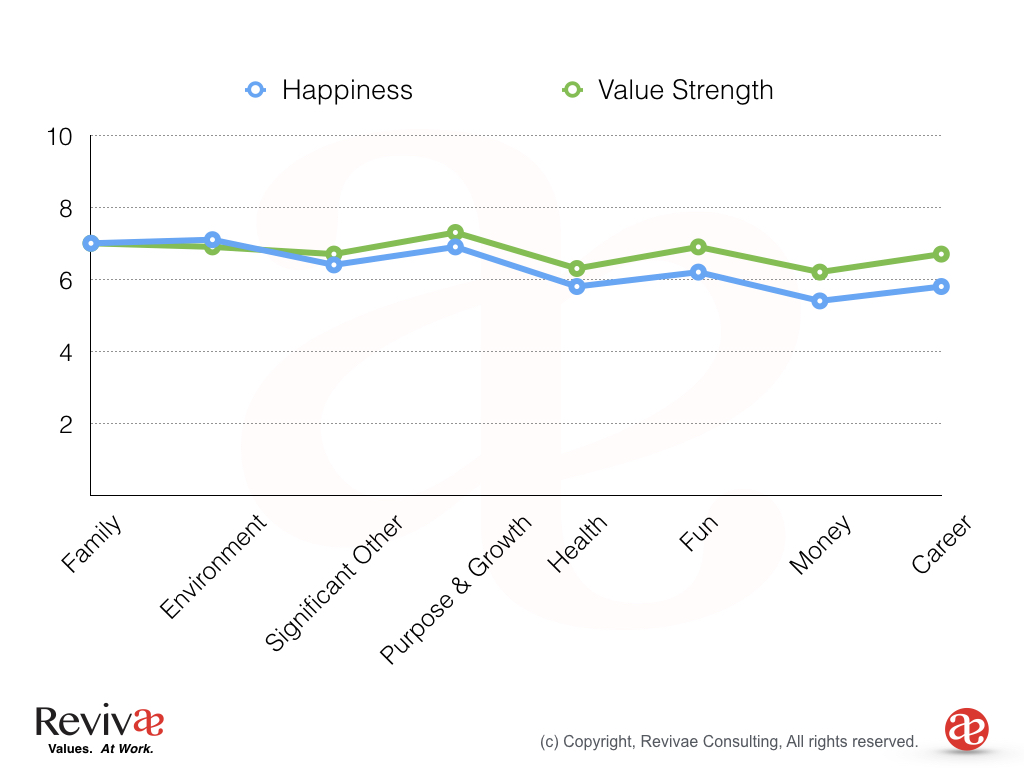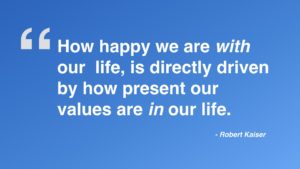Martin Luther King, Jr. wrote,
“Our scientific power has outrun our spiritual power. We have guided missiles, and misguided men.” (1)
I believe we’re all born with a natural guidance system, and at Revivae, the tool we use to help people connect with and understand that system… is their values. The theory at the heart of our work is this: “How happy we are with our life, is directly dependent on how present our values are in our life.” After five years of working with values in both personal and professional settings, I’d like to share with you some quantitative data backing up our theory.
_
The graph below presents averaged results from over 200 people who completed their values work using Revivae’s proprietary Values Development & Assessment Tool (2). Here’s how to read the chart:
- The blue line shows how happy people felt in different aspects of life.
- The green line shows how present each person felt their values were in everyday life.
- The life aspect with the smallest gap between Happiness and Value Strength is on the left, moving to the aspect with the greatest gap on the right.
Take a moment to study the chart:
- What do you notice about the connection between Happiness and Value Strength?
- In which aspect of life do people seem to be having the hardest time living their values?

_
Here’s what we see, and why we think it’s important:
1. There is a clear correlation between Values and Happiness:
Our data: Where Happiness is higher, Value Strength is higher too. Where Happiness drops, so does Value Strength.
Our theory: Working through the Values Development & Assessment process is an eye-opening experience for most people. When values are developed in a truly meaningful way, we gain access to a whole new way to view our lives. If we can identify where specific values are lacking, we can then target specific opportunities to bring them more intentionally into focus. This isn’t just how we become happier at work and play, this is how we grow and evolve as people.
2. We need more values at work:
Our data: The “Career” life aspect is the part of our lives where most of us have the hardest time living in alignment with our values.
Our theory: If we spend between 25 and 30 years of our life at work (3), then the quality of our work environment – its culture – has a profound impact on the overall quality of our lives. 90% of executives know their organization’s culture is important, but only 12% can describe it. (4) Values are what defines a culture. An engaged workplace is built through the alignment of an individual’s personal values with the values of the organization.
3. Our values lead our happiness:
Our data: In all but one life aspect where there is a gap between our two data points, it’s Value Strength that has the higher rating.
Our theory: I believe this speaks directly to why values are the most effective tool for personal growth and professional development I’ve ever seen. Values are aspirational. They pull us forward. We seek them, and as we do, our fundamental character is changed for the better. It’s this change in our character that pulls our Happiness up along with it.
_
So what?
 When we’re happy with an aspect of our life, we’re living it in alignment with our values. Where we’re not as happy with part of our life, then the decisions we’re making and the actions we’re taking are not value aligned. This is true whether we know what our values are or not. We can either continue to leave our happiness up to chance and circumstance, or we can do the work needed to develop our values and learn how to use them as tools to create a happier and more meaningful life.
When we’re happy with an aspect of our life, we’re living it in alignment with our values. Where we’re not as happy with part of our life, then the decisions we’re making and the actions we’re taking are not value aligned. This is true whether we know what our values are or not. We can either continue to leave our happiness up to chance and circumstance, or we can do the work needed to develop our values and learn how to use them as tools to create a happier and more meaningful life.
There’s no ‘chicken or the egg’ question here. To be happier, we must first learn to live in stronger alignment with our values.
If you, your team, or your organization would like to be value driven, let’s connect.
Choose well,
Rob
References:
- “Strength to Love” – Martin Luther King Jr., Sermon, “The Man Who Was A Fool,” p76, first published in1963.
- Happiness and Value Strength; Data from the Values Development and Assessment Tool; Revivae Consulting, Inc.
- “What percentage of our lives is spent working?”- reference.com.
- “5 Steps for Building an Ideal Company Culture (And what to watch out for!)” Online webinar hosted by Qualtrics and Bamboo HR.

